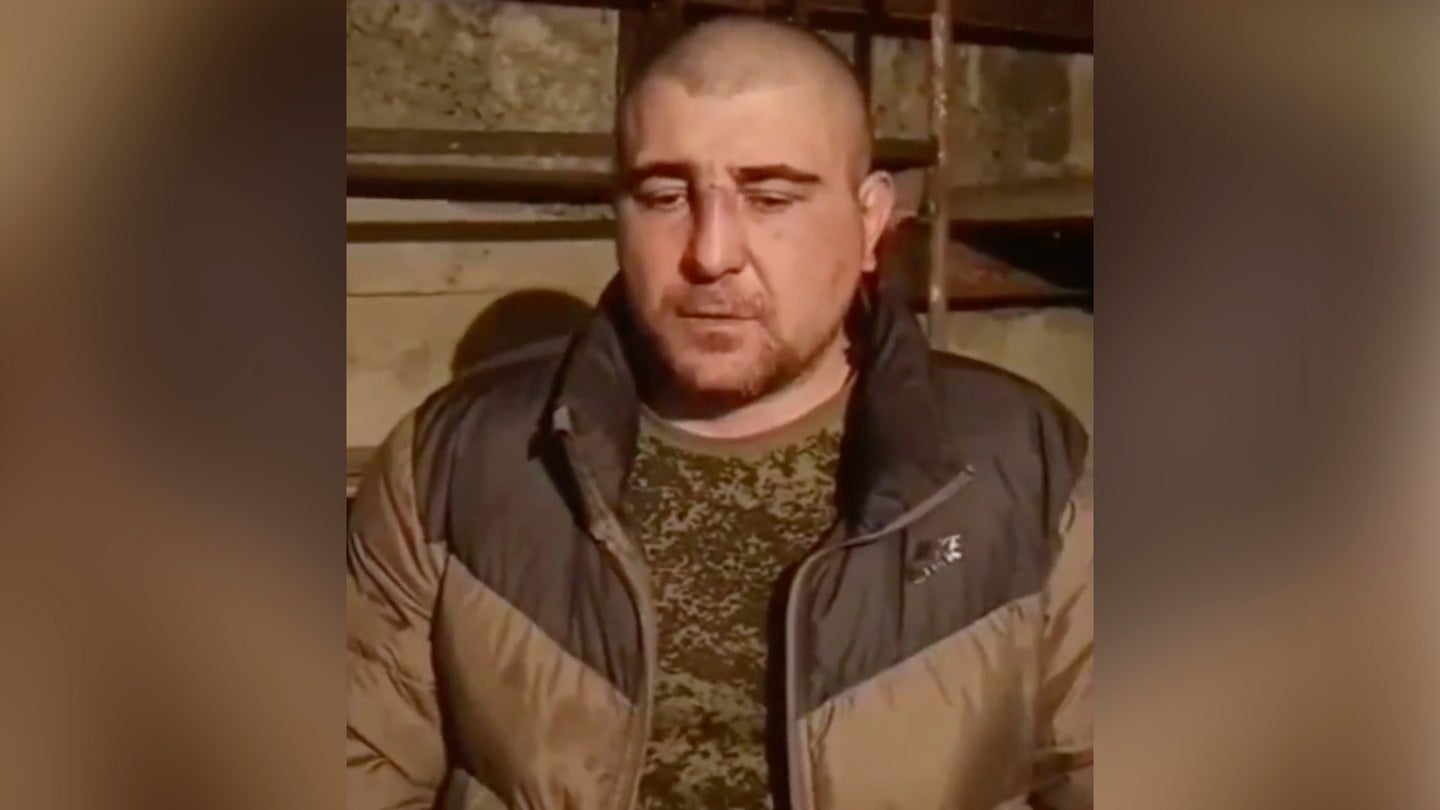Wagner mercenaries capture Russian brigade commander
Wagner vs. Russian army.

In a bizarre turn of events, Russia’s Wagner Group private military company has captured a man in Ukraine who identified himself as a Russian lieutenant colonel and forced him to confess on video to opening fire on Wagner mercenaries.
The video shows Lt. Col. Roman Venevitin, commander of Russia’s 72nd Brigade, being interrogated as if he were a captured member of Ukraine’s military.
In the video, Venevitin tells his off-camera interrogator that he fired on a car that belonged to Wagner forces while he was drunk “due to personal animosity.” He further says that he and between 10 and 12 of his soldiers disarmed a Wagner quick response force.
When asked how his actions can be described, Venevitin pauses for several seconds and then says, “Guilty.”
Subscribe to Task & Purpose Today. Get the latest military news and culture in your inbox daily.
This incident illustrates how little control Russia’s defense ministry has over the Wagner Group, said Kateryna Stepanenko, a Russia analyst with the Institute for the Study of War think tank in Washington, D.C.

Although Wanger Group forces depend on the Russian defense ministry for their ammunition, they are mostly independent from the Russian military, Stepanenko told Task & Purpose.
“In their ability to decide where they want to operate, which direction of the front line they want to reinforce, we are increasingly seeing that Wagner is their own boss, essentially; whereas other units, such as the 72nd Brigade, are more subordinate to the Russian ministry of defense, even though this organization is an irregular formation,” Stepanenko.
Moreover, the Wagner Group’s owner Yevgeny Prigozhin has shown personal animosity toward Russia’s 72nd Brigade, which he accused of abandoning its position near Bakhmut last month, Stepanenko said.
“The 72nd Brigade f–ked up around 3-square kilometers this morning, where I had lost around 500 men,” Prigozhin said in a May 9 video.
Prigozhin later claimed that his mercenaries had captured Bakhmut after a monthslong bloody battle. In order to continue to remain relevant, Prigozhin is trying to portray Russian military forces as weak and ineffectual, Stepanenko said.

“He is trying to blame the 72nd Brigade, alongside other regular forces, for losses around Bakhmut after Wagner’s withdrawal from the city,” Stepanenko said. “This is a way to amplify his political goals, to appeal to his followers on social media and so on. So, there is a longstanding conflict between the 72nd Brigade and Prigozhin that was initiated by Prigozhin himself.”
It is unclear whether the Wagner Group may have crossed a red line by capturing a Russian military officer and shaming him on video, Stepanenko said. Prigozhin has already indirectly criticized Russian President Vladimir Putin and lashed out at Russia’s top military leaders.
Additionally, the 72nd Brigade was not part of the Russian army before the latest invasion of Ukraine, Stepanenko said. The unit was formed in 2022 from volunteer battalions, which were created to replace Russian losses in Ukraine.
“I don’t think that this unit is perceived within the Russian military command as a conventional unit,” Stepanenko said. “So, I don’t know to what extent this is an attack that could translate to a bigger escalation in the relationship between Prigozhin and the Russian military of defense at this point.”
Putin has long used a strategy of divide and conquer to rule Russia, and he is using the same approach toward the country’s security forces by pitting various factions against each other, said Ivana Stradner, a Russia expert with the Foundation for the Defense of Democracies think tank in Washington, D.C.

With Russian forces performing so poorly in Ukraine, Putin has tried to pull off a balancing act between Wagner and military forces that are under the control of Russian Defense Minister Sergei Shoigu, Stradner told Task & Purpose.
“There have been numerous problems between Shoigu and Prigozhin over the last – at least – six months,” Stradner said. “Having those internal problems within the Russian army and different military groups is one of the best gifts that we can have in the West.”
The rivalry between Prigozhin and Russian Defense Minister Sergei Shoigu boiled last month, when Prigozhin’s press service accused Russian troops of placing land mines on routes that Wagner forces needed to leave Bakhmut on May 17 and then opened fire on Wagner mercenaries who were clearing the mines, Business Insider reported.
In light of the ongoing conflict between Wagner and Russia’s military, it is not surprising that Prigozhin’s forces captured the commander of the 72nd Brigade to send a message to Russia’s defense ministry, Stradner said.
By acting almost totally independently of the Russian military establishment, Priozghin serves several functions for Putin, said Ivan Fomin, Democracy Fellow with the Center for European Policy Analysis.
Prizoghin and the Wagner Group serve as a counterweight to the Russian military’s political influence, Fomin told Task & Purpose.
“It is precisely because Prigozhin’s Wagner Group operates independently that it is sometimes more militarily effective than the regular army,” Fomin said. “It can bypass the Russian army structure with its defects and limitations in terms of organization, communication, and recruitment.”
Prigozhin also serves as a safety valve for the Kremlin by calling for a total mobilization of Russia’s military to fight the war in Ukraine, Fomin said.
“For the Kremlin, this might seem to be a relatively safe way to channel these sentiments shared by some parts of the Russian public,” Fomin said. “To play this role, Progozhin also needs to be independent from the army, which may seem too soft and ineffective.”
The latest on Task & Purpose
- Air Force said AI drone killed its human operator in a simulation
- The Army says it’s made ‘significant improvements’ to its troubled new infantry squad vehicle
- What we know about China’s hacking of Navy systems
- Taliban moving captured US military vehicles and Soviet tanks to Iranian border
- Five juveniles arrested for attack on Marines caught on video
